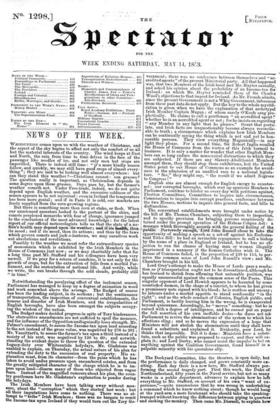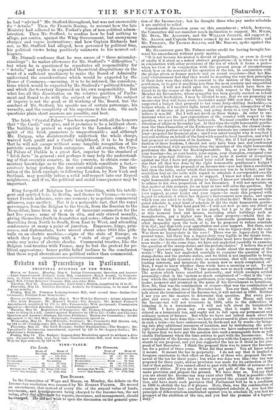The Dockyard Committee, like the theatres, is open daily, but
the performance is daily changed, and grows constantly more ex- citing. Each day there is a new hero, Mr. Stafford alwa_ys per- forming the second tragedy part. First this week, the Duke of i Northumberland, fifty years n the Naval service, but not so many weeks in a public department, advances to explain how he left everything to Mr. Stafford, on account of his own "want of ex- perienee,"—quite unconscious that he was wrong in undertaking a command which he knew nothing about; though he would hang at the yard-arm a mere lieutenant who should take the speaking- trumpet without knowing the difference between piping to quarters and sucking the monkey. Then came Mr. Disraeli, to explain how he had " advised " Mr. Stafford throughout, but was not answerable for "details." Then Sir Francis Baring, to recount how the late Ministry had adhered to Mr. Parker's plan of non-political admin- istration. Then Mr. Stafford, to confess how he had nothing to allege, per contra, against the Whig Government, but anonymous charges and vague insinuations ; and how Captain Richards had not, as Mr. Stafford had alleged, been governed by political bias, his political views being positively unknown to his nearest col- leagues. Mr. Disraeli confesses that he was aware of "these misunder- standings"; he makes allowance for Mr. Stafford's " difficulties " ; but when he is questioned he repudiates all responsibility for 4 "details," and replies in expanded theoretical disquisitions on the want of a sufficient machinery to make the Board of Admiralty understand the considerations which would be expected by the House of Commons,—meaning, it is to be inferred, the considera- tions which would be expected by Mr. Stafford's "political friends," and which the Secretary dispensed on his own responsibility. But what has all this dissertation on the relative position of Parlia- ment and Board to do with the subject of inquiry ? The subject of inquiry is not the good or ill working of the Board, but the conduct of Mr. Stafford, his specific use of certain patronage, his veracity, and the complicity of his superiors in his acts. On such questions plain short answers are possible, and best.



























